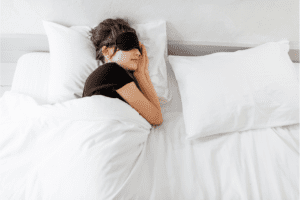—
Links JJ mentions in the video:
Learn how to better manage stress in this video:
Order an advanced thyroid panel (plus find more tests) here:
Learn all about insulin resistance and how to prevent it here:
Hear why vitamin D is so important:
Listen to my talk about managing menopause with Dr. Anna Cabeca:
Order DIM here:
Order CoQ10 here:
Order Annatto-E GG here:
—
Want to learn about nutrition & weight loss? Me and my team of holistic health experts have put together this playlist just for you –
Any one of our videos have the power to transform your body and your life so make sure you never miss one by clicking here to subscribe
—
Hi I’m JJ, welcome to my channel. If you’re looking to lose weight, boost your energy and look and feel fabulous and fit over 40, you’re in the right place.
Here you’ll find the healthy recipes, fitness routines and the nutrition information you need to achieve healthy weight loss that stays off.
Welcome to the family!
—
NEW FOR 2022:
MY MOST POPULAR VIDEOS:
THE VIRGIN DIET – LIFESTYLE SHOW:
HEALTHY RECIPES:
#SHORTS:
—
#JJVirgin #Menopause #Health #HealthyLifestyle #Hormones #TSH #VitaminD #Stress #CoQ10 #AnnattoEGG #DIM #InsulinResistance #Thyroid #Wellness
—
The average age of menopause is 51, but it can happen anytime between the ages of 45 and 55. For some women, though, menopause can start much earlier – sometimes even before they reach their 40s. No matter when it happens, though, menopause can be a challenging time. Symptoms such as hot flashes, night sweats, mood swings, and memory problems can make life difficult. But don’t worry – there are natural ways to manage these symptoms. Read on to learn more!
1. Manage hot flashes with diet and lifestyle changes. Hot flashes are one of the most common menopausal symptoms, and they can be very uncomfortable. But there are things you can do to manage them. First, try to avoid triggers such as caffeine, alcohol, and spicy foods. Second, dress in layers so you can take off clothing if you start to feel too warm. Third, practice stress-relieving techniques such as yoga or meditation. And finally, stay cool by using a fan or air conditioner.
 2. Combat night sweats with sleep hygiene changes. Night sweats are another common symptom of menopause, and they can make it difficult to get a good night’s sleep. To combat them, try making some changes to your sleep hygiene. First, make sure your bedroom is cool and comfortable. Second, establish a regular bedtime routine. third, avoid caffeine and alcohol before bed. And finally, practice relaxation techniques such as deep breathing or progressive muscle relaxation.
2. Combat night sweats with sleep hygiene changes. Night sweats are another common symptom of menopause, and they can make it difficult to get a good night’s sleep. To combat them, try making some changes to your sleep hygiene. First, make sure your bedroom is cool and comfortable. Second, establish a regular bedtime routine. third, avoid caffeine and alcohol before bed. And finally, practice relaxation techniques such as deep breathing or progressive muscle relaxation.
3. Ease mood swings with exercise and self-care. Mood swings are another common menopausal symptom, and they can be very frustrating. But there are things you can do to ease them. First, try to get regular exercise – it can help boost your mood and energy levels. Second, practice stress-relieving techniques such as yoga or meditation. Third, make time for things you enjoy doing – whether it’s reading, spending time with friends, or taking walks in nature. And finally, be sure to get enough sleep.
4. Manage memory problems with lifestyle changes. Memory problems are another common menopausal symptom, and they can be very frustrating. But there are things you can do to ease them. First, try to stay organized and make lists to help you remember things. Second, practice memory exercises such as mnemonic devices or memory games. Third, get regular exercise – it can help improve your memory and cognitive function. And finally, eat a healthy diet – foods rich in omega-3 fatty acids have been shown to improve memory and cognitive function.
 5. Talk to your doctor about hormone therapy. For some women, menopause symptoms can be very severe. If this is the case for you, talk to your doctor about hormone therapy. This treatment can help relieve symptoms such as hot flashes, night sweats, mood swings, and memory problems. It’s important to talk to your doctor about the risks and benefits of hormone therapy before starting any treatment.
5. Talk to your doctor about hormone therapy. For some women, menopause symptoms can be very severe. If this is the case for you, talk to your doctor about hormone therapy. This treatment can help relieve symptoms such as hot flashes, night sweats, mood swings, and memory problems. It’s important to talk to your doctor about the risks and benefits of hormone therapy before starting any treatment.
Menopause can be a challenging time, but there are things you can do to ease the symptoms. With diet and lifestyle changes, you can manage hot flashes, night sweats, mood swings, and memory problems. And if your symptoms are severe, talk to your doctor about hormone therapy. No matter what, though, remember that you’re not alone – millions of women are going through menopause right alongside you! Contact us today for more information about the products we offer and how they can help you find relief from menopause. We hope this article has been helpful in providing some information about natural menopause relief solutions.



The audio volume was low
Hi JJ, do you recommend taking HRT if you are fully menopausal at 50.